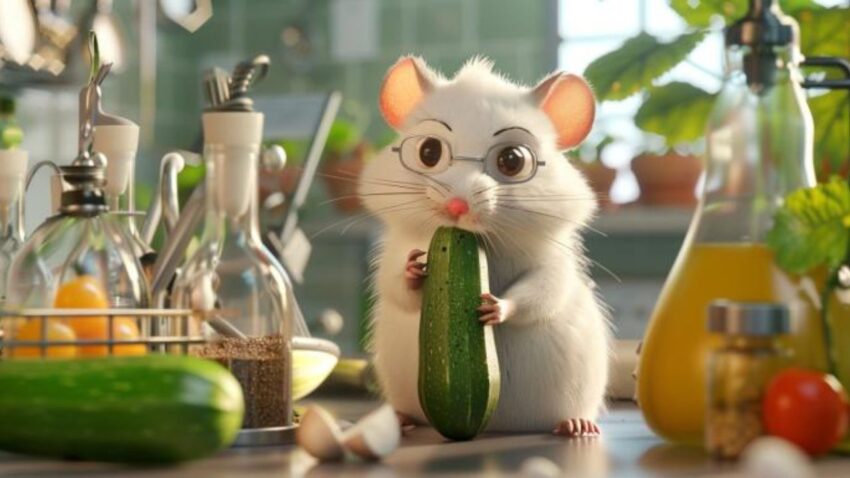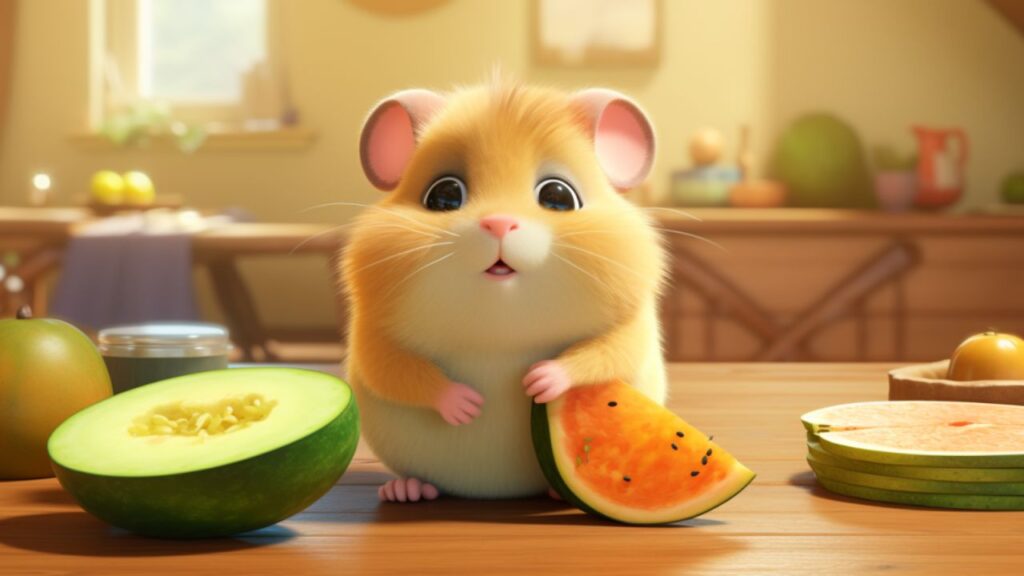TL;DR Summary
Yes, hamsters can safely enjoy zucchini as part of their diet. Zucchini is non-toxic to hamsters and offers hydration and essential nutrients like potassium and vitamins. However, it should be introduced gradually and in small amounts to avoid digestive upset. Always use organic or thoroughly washed zucchini to minimize pesticide exposure. Feed zucchini along with a balanced diet that includes a variety of vegetables and their regular hamster food. Moderation is key—offer small diced pieces a few times a week to keep your hamster healthy and happy. Remember, a happy hamster is a wheel-y happy you!
When it comes to feeding hamsters, owners often seek variety to ensure their pets are not only happy but also receiving a balanced diet. A common question that arises is whether it’s safe to introduce vegetables like zucchini into a hamster’s diet. This article explores the suitability of zucchini for hamsters, shedding light on its nutritional benefits and potential risks to help owners make informed feeding decisions.
The Importance of Knowing Safe Foods for Hamsters
Understanding which foods are safe for hamsters is crucial for their health and well-being. Just as certain foods can provide essential nutrients and variety, others can be harmful, even if they’re healthy for humans. Each type of food introduced to a hamster must be evaluated not only for its nutritional content but also for any potential health risks it may pose. This knowledge ensures that your hamster enjoys a varied, safe, and nutritionally balanced diet, supporting their overall health and longevity.
Why Zucchini? Exploring Its Role in a Hamster’s Diet
Zucchini is a common vegetable in human diets, known for its versatility and health benefits, but its role in a hamster’s diet is less straightforward. This section will delve into why zucchini might be considered for hamsters, examining its nutritional makeup and how these properties can potentially align with the dietary needs of these small rodents. Understanding the specific benefits and potential drawbacks of zucchini will help hamster owners make better-informed decisions about incorporating this vegetable into their pet’s feeding regime.
Nutritional Content of Zucchini
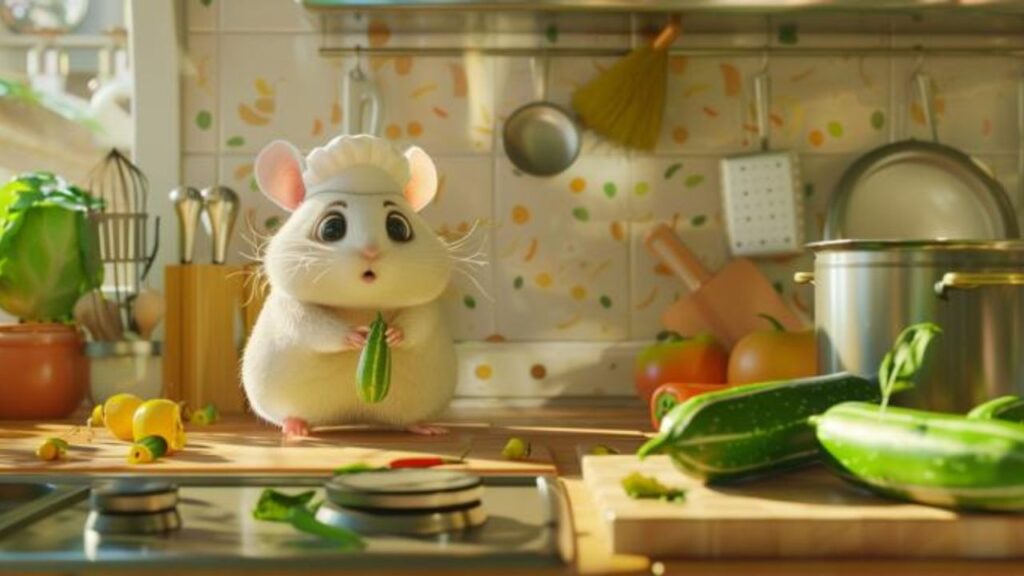
Zucchini, also known as courgette, is a summer squash that grows abundantly and has become a staple in many kitchens due to its versatility and mild flavor. But beyond its culinary uses, zucchini offers numerous health benefits, making it an appealing option for those looking to enrich their diets, including potentially those of their pets.
Overview of What Zucchini Is and Its General Health Benefits
Zucchini is a member of the Cucurbitaceae family, which includes cucumbers and melons, and is rich in water and fiber, making it exceptionally hydrating and good for digestion. It’s low in calories but rich in essential nutrients such as vitamins A and C, several B vitamins, potassium, and manganese. For humans, these attributes contribute to better heart health, improved vision, and heightened immunity. Its high fiber content can also aid in weight management and promote a healthy digestive tract.
Breakdown of the Nutritional Components Relevant to Hamsters
When considering zucchini for hamsters, it’s important to examine the specific nutrients that can benefit these small animals:
- Vitamin C: Unlike humans, hamsters can produce their own vitamin C, but boosting their intake through safe vegetables like zucchini can help prevent scurvy and bolster their immune system.
- Potassium: This mineral helps in maintaining proper heart function and muscle health, both crucial for active pets like hamsters.
- Fiber: High in fiber, zucchini can aid in the digestive health of hamsters, helping to prevent constipation and promote a healthy gut.
- Water Content: The high water content of zucchini makes it a hydrating food, which can be particularly beneficial during warmer weather or for hamsters that might not drink sufficient water.
However, it’s also important to note that while zucchini is low in sugar and fat, which aligns well with the dietary needs of hamsters, it should still be introduced gradually and in moderation to prevent any digestive upset. The low calorie and high water content, while beneficial, mean that zucchini should be a supplement to, not a replacement for, the more nutrient-dense staples of a hamster’s diet.
Is Zucchini Safe for Hamsters?
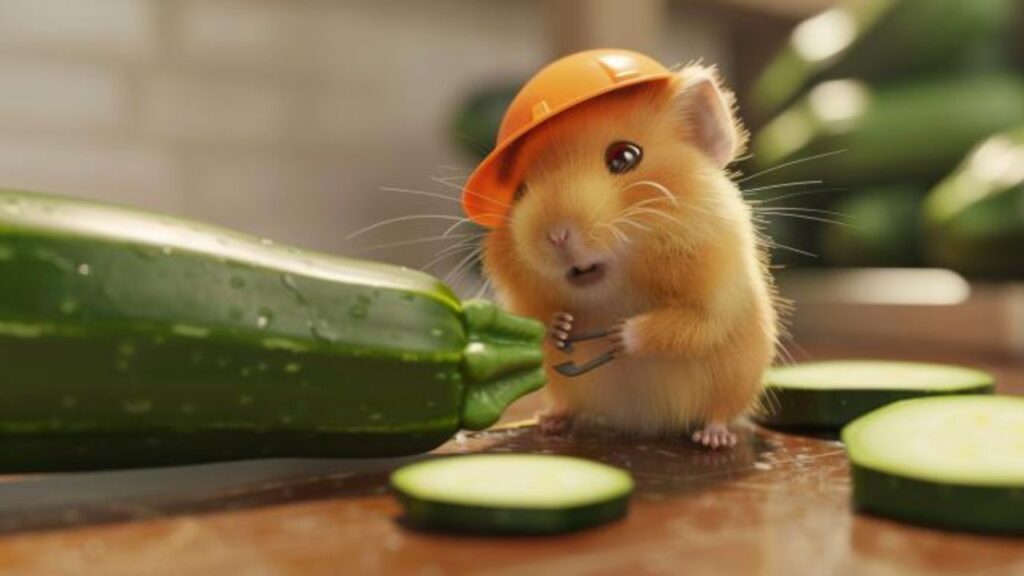
Understanding whether a specific food is safe for your pet is paramount. For hamster owners, introducing new foods like zucchini can be a source of nutritional enhancement but also potential concern. Here, we’ll explore the safety of zucchini for hamsters, assessing both its benefits and potential risks to ensure it can be a healthy addition to your hamster’s diet.
Detailed Analysis of Zucchini’s Safety for Hamsters
Zucchini is generally considered safe for hamsters to consume in small, controlled amounts. It is non-toxic, and its natural softness and moisture content make it easy for hamsters to chew and digest. However, the key to safely incorporating zucchini into your hamster’s diet lies in moderation and proper preparation.
Potential Benefits of Feeding Zucchini to Hamsters
- Hydration: Due to its high water content, zucchini can be a good source of hydration, particularly beneficial during hot weather.
- Nutrient Intake: Zucchini provides additional vitamins and minerals that can support the overall health of hamsters, such as potassium and vitamin A.
- Digestive Health: The fiber in zucchini can help regulate digestion, aiding in smooth bowel movements and preventing constipation.
Potential Risks of Feeding Zucchini to Hamsters
- Digestive Upset: While fiber is beneficial, introducing too much zucchini too quickly can cause digestive upset in hamsters. Their digestive systems are sensitive, and sudden changes in diet can lead to diarrhea or bloating.
- Nutritional Imbalance: Relying too heavily on zucchini, which is low in calories and not very nutrient-dense, can lead to nutritional deficiencies if it displaces more nutritious foods in the diet.
- Pesticide Exposure: Like all fruits and vegetables, zucchini can carry residues of pesticides unless thoroughly washed or organically sourced. These chemicals can be harmful to hamsters even in minute quantities.
In summary, while zucchini can be a healthy treat that offers variety and beneficial nutrients to a hamster’s diet, it must be introduced cautiously. Always start with a small amount to see how your hamster reacts, and ensure it is clean and free from any chemical residues.
How to Safely Introduce Zucchini to Your Hamster’s Diet
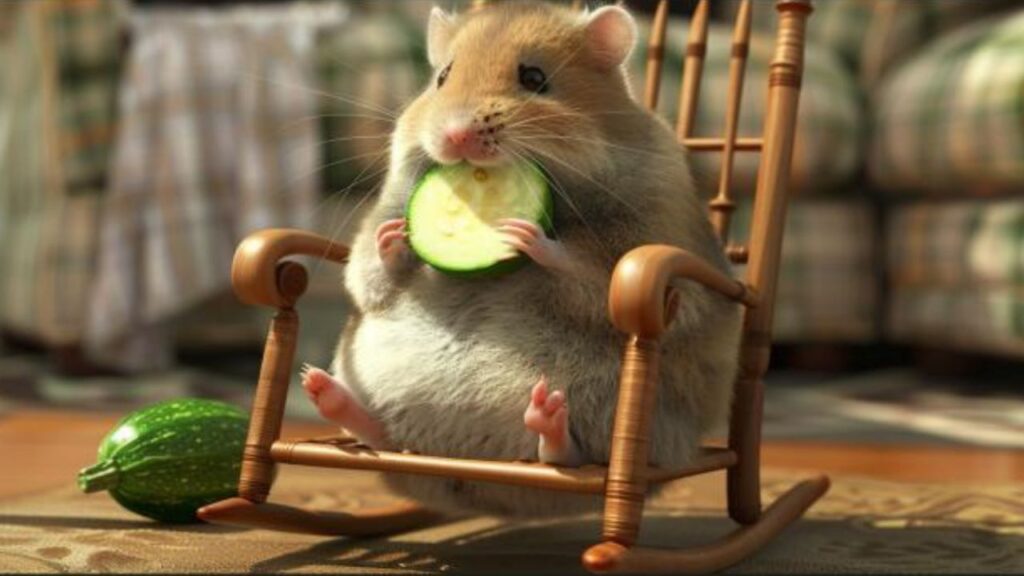
Introducing new foods to a hamster’s diet should be done with care to avoid any health issues. Zucchini, while beneficial, requires cautious introduction to ensure it is well tolerated and enjoyed by your hamster. Here’s a step-by-step guide on how to safely incorporate zucchini into your hamster’s eating regimen.
Step-by-Step Guide on Introducing Zucchini to Hamsters
- Start Small: Begin by offering a small piece of zucchini to your hamster. This should be no larger than a cubic centimeter — roughly the size of a small dice.
- Wash Thoroughly: Always wash the zucchini thoroughly to remove any pesticides or contaminants that might be on the skin. Organic zucchini is preferable to minimize these risks.
- Peel and Chop: Initially, it might be wise to peel the zucchini to reduce the risk of pesticide exposure even further, although the skin is safe if the zucchini is well-washed and organic. Chop the zucchini into small, manageable pieces that your hamster can easily eat.
- Introduce Gradually: Offer this small piece of zucchini and observe your hamster’s reaction to it over the next 24-48 hours. Look for any signs of digestive upset or refusal to eat.
- Monitor Health: Keep an eye on your hamster’s stool and overall activity level. If there are no signs of digestive distress, you can continue to include zucchini in their diet.
Recommended Portion Sizes and Frequency of Feeding
- Portion Size: If your hamster shows no negative signs after the initial introduction, you can make zucchini a regular part of their diet. A small piece (the size of a dice) every few days is sufficient.
- Frequency of Feeding: Zucchini should be given as a supplement to the hamster’s regular diet, not as a main component. It can be offered 2-3 times a week as part of a balanced diet that includes a variety of vegetables, fruits (in very small amounts due to sugar content), and their standard hamster food.
Additional Tips for Feeding Zucchini to Hamsters
- Variety is Key: Always strive for a balanced diet that includes a variety of different vegetables and fruits to ensure a range of nutrients.
- Remove Uneaten Portions: Any uneaten zucchini should be removed from your hamster’s cage within 24 hours to prevent spoilage and the development of harmful bacteria.
By following these guidelines, you can safely introduce zucchini into your hamster’s diet, providing them with a hydrating and nutritious snack that adds variety to their feeding routine.
Whisker Tips: Best Practices for Feeding Hamsters Zucchini

Incorporating zucchini into your hamster’s diet can be a refreshing change that offers additional nutrients and hydration. However, proper preparation and careful monitoring are key to ensuring that this new addition benefits your hamster without causing any issues. Below are some practical tips on how to feed zucchini to your hamster, as well as general advice on dietary diversity and health monitoring.
Practical Tips on Feeding Zucchini
Preparation
- Organic Choice: Opt for organic zucchini when possible to minimize exposure to harmful pesticides and chemicals.
- Thorough Washing: Regardless of whether it’s organic or not, wash the zucchini thoroughly under running water to remove any surface contaminants. A vegetable wash can be used, followed by a thorough rinse.
- Peeling: Initially, peeling the zucchini can help reduce any remaining risk from surface residues, especially if non-organic.
- Chopping: Cut the zucchini into small, manageable pieces that are easy for your hamster to handle and eat. Tiny cubes or thin slices work well.
Storage
- Refrigeration: Store unused portions of zucchini in the refrigerator to keep them fresh. It’s best to offer your hamster bits of zucchini soon after cutting it to ensure it’s fresh and hydrating.
- Preparation in Small Batches: Prepare small amounts of zucchini at a time to avoid waste. Fresh is always best when it comes to feeding your hamster.
Additional Advice on Dietary Diversity and Monitoring Hamster Health
Dietary Diversity
- Balanced Diet: Ensure that zucchini is only a part of a diverse and balanced diet. Hamsters also need a variety of other vegetables, occasional fruits, and their staple hamster pellets which provide essential nutrients.
- Moderation: Introduce any new food, including zucchini, gradually and in moderation to observe how your hamster reacts and to avoid digestive upset.
Monitoring Health
- Watch for Signs of Distress: After introducing zucchini, monitor your hamster for signs of gastrointestinal distress such as diarrhea or changes in stool consistency. Also, observe for changes in general activity and appetite.
- Regular Health Checks: Regularly check your hamster for any signs of illness or changes in behavior. Early detection of problems can make a significant difference in outcomes.
By following these “Whisker Tips,” you can safely incorporate zucchini into your hamster’s diet while ensuring they remain healthy and happy. Remember to always introduce new foods slowly and watch how your pet responds to them. A varied diet not only keeps your hamster healthy but also enriches their life, providing them with a range of flavors and textures to enjoy.
Conclusion
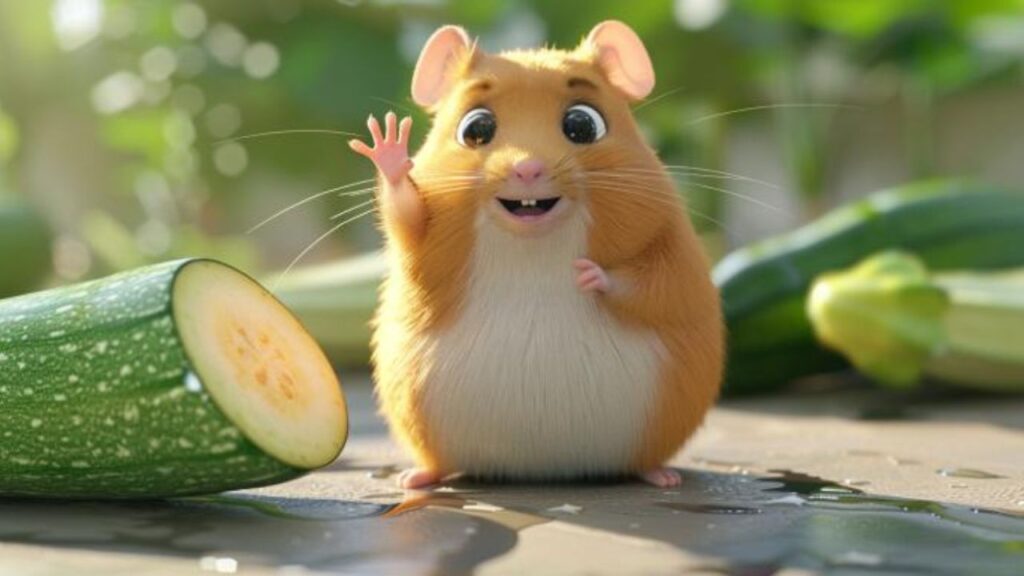
In our exploration of whether hamsters can have zucchini, we’ve discussed the nutritional benefits, the potential risks, and the best practices for safely incorporating this vegetable into your hamster’s diet. Zucchini, when prepared and introduced properly, can be a healthy and hydrating addition to your pet’s feeding regimen. However, it’s crucial to balance this with a variety of other foods to ensure a well-rounded diet.
Final Thoughts on the Appropriateness of Zucchini for Hamsters
Zucchini is safe for hamsters to consume in moderation. It provides essential nutrients such as potassium and vitamins, and its high water content can help keep your hamster hydrated. However, like any new food, zucchini should be introduced slowly and in small amounts to monitor how your hamster reacts to it. Always prioritize organic or thoroughly washed zucchini to avoid pesticide exposure and peel the zucchini when introducing it for the first time.
Signature Closing
By adhering to these guidelines, you can offer zucchini as part of a diverse and nutritious diet, enhancing your hamster’s health and happiness. Remember, the key to a healthy hamster is not just a wheel to run on, but a well-balanced diet to fuel their tiny engines! Remember, a happy hamster is a wheel-y happy you!

